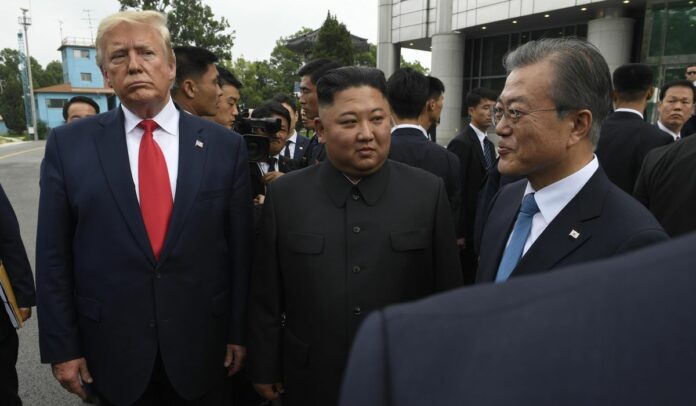U.S. prosecutors have indicted 28 North Koreans and five Chinese nationals as part of a global network of companies charged with circumventing U.S. sanctions by covertly accessing the American financial system.
The 14-count federal grand jury indictment represents the largest enforcement action ever against North Korea by the Justice Department, which has played a stepped-up role under the Trump administration to enforce sanctions policies toward North Korea and China.
An indictment unsealed Thursday in Washington accuses the North Koreans of using the state-run Foreign Trade Bank of North Korea in Pyongyang and hundreds of front companies around the world of being part of an operation to avoid U.S. financial sanctions.
“The defendants in this case used more than 250 front companies to allegedly obscure $2.5 billion in illicit financial dealings conducted by North Korea’s Foreign Trade Bank,” said Michael R. Sherwin, acting U.S. attorney for the District of Columbia.
“Through this indictment, the United States has signified its commitment to hampering North Korea’s ability to illegally access the U.S. financial system and limit its ability to use proceeds from that illicit action to enhance its illegal weapons of mass destruction programs,” Mr. Sherwin told The Washington Times.
The U.S. government has seized at least $63.5 million of the funds from the North Koreans through forfeiture actions over the past five years, and the U.S. government and the U.N. Security Council have sanctioned the Foreign Trade Bank.
The investigation has been underway since at least 2018, officials said. The charges include conspiracy, bank fraud, violations of weapons of mass destruction sanctions regulations and money laundering. The locations of those named in the indictment are not known. The unsealing of the court papers Thursday appeared to be a “name and shame” move to highlight Pyongyang’s illicit networks.
The Foreign Trade Bank was hit with Treasury Department sanctions in March 2013 when the Obama administration was attempting to curb North Korean ballistic missile and nuclear programs. It was the first time the Justice Department indicted a group of North Koreans for illicit financial activities.
The indictment also revealed that at least four Chinese banks and several Chinese companies, including two telecommunications companies and an electronics company, helped the North Koreans purchase equipment and move cash. Most of Chinese banks and companies were not identified by name.
Despite global sanctions, China remains an economic lifeline for its poor neighbor. At least 90% of North Korea’s trade goes through China.
Two of the Chinese firms were identified as Dandong Kehua, described in the indictment as a co-conspirator, and Panda International Information Technology, which the Commerce Department sanctioned in 2014.
Extensive dollar transactions
According to the 16-page indictment, the North Koreans conducted extensive dollar transactions for the trade bank. Two of the bank’s presidents, Ko Chol-man an and Kim Song-ui, and two bank vice presidents, Han Ung and Ri Jong-nam, were among those indicted. The Trump administration sanctioned Mr. Ko in 2017 as a North Korean government official.
Two of the North Korean defendants worked for a covert branch of the Foreign Trade Bank in Shenyang, China, and three others operated North Korean front companies identified as Sumer International Group Ltd. and Headsoon Trading, U.S. officials allege.
The indictment says the North Koreans have been using the U.S. financial system illegally since March 2013 and purchased products and services for the domestic economy.
The front companies’ covert bank branches were widely spread, including in Beijing and Zuhai, China, and in Austria, Kuwait, Libya and Thailand. The North Korean official in charge of the Thai front was identified as Han Ki-song, a member of the Reconnaissance General Bureau, a civilian North Korean intelligence agency.
Two Russia-based Foreign Trade Bank fronts were located in Vladivostok, in the country’s Far East, and Khabarovsk.
Some of the charges were issued under the 1977 International Emergency Powers Act, which allows the president to impose economic sanctions related to national security, foreign policy or economic threats.
The indictment also cites alleged North Korean violations of a 2016 executive order aimed at curbing the export of U.S. financial services that could boost North Korea’s pursuit of nuclear and missile programs.
Additional violations of the Bank Secrecy Act were identified by the Financial Crimes Enforcement Network, and other charges were issued under the USA Patriot Act.
“The defendants and other co-conspirators took up residence in foreign countries to operate these covert branches, from which they opened and operated front companies and worked with established third-party financial facilitators to procure commodities and facilitate payments in U.S. dollars on behalf of parties in North Korea,” the indictment states.
The Pyongyang-based Foreign Trade Bank concealed its role in the dollar payments from U.S. and other foreign banks “in order to trick the banks into processing payments” that were prohibited, the indictment states.
More front companies were established after the government or foreign banks uncovered the identities of the North Korean financial institutions.
Prosecutors said the indictments were based on intercepted communications between the North Koreans and the various companies, including specific cash transfers starting in 2013 and continuing until as recently as January. The payments ranged in size from around $10,000 to $13.9 million.






